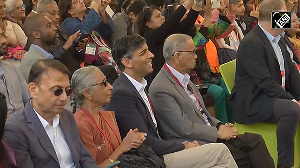Accusing Pakistan President Pervez Musharraf of violating all legal and constitutional boundaries, deposed Supreme Court judge Rana Bhagwandas has said that "days of his authoritarianism are numbered".
Bhagwandas, who turned 65 on Thursday, said, "I think it (Musharraf's presidency) will hardly survive for two or three months."
"I am an optimistic man actually, and I never lose faith in Allah. This spirit keeps me hoping that the (pre-emergency) judiciary will be restored and all the deposed judges will ultimately regain their positions," he told the Dawn newspaper.
Musharraf is "increasingly isolated" after the recent political crisis and the "days of his authoritarianism are numbered", Bhagwandas said.
The President "violated all legal and constitutional boundaries" and imposed emergency last month because he "feared that the Supreme Court could take a decision against him" regarding his re-election in uniform, he said.
Bhagwandas also said he was not happy with the role played by political parties during the lawyers' movement against the military regime.
"They (parties) should resist. They did not come up with any impressive campaign during the whole crisis that erupted after the presidential reference was filed against the Chief Justice (Iftikhar M Chaudhry) on March 9," he said.
The lone Hindu to reach the highest echelons of Pakistan's judiciary, Bhagwandas refused to endorse the emergency and was dismissed by Musharraf along with other judges. He was the second highest ranking apex court judge after deposed Chief Justice Iftikhar Mohammed Chaudhry.
Bhagwandas said the decision taken by some political parties to boycott the January 8 parliamentary polls was not a wise move.
"It is true that the elections would legitimise all the unconstitutional measures taken but at the same time, the political parties must attempt to reach the Parliament and oppose such legislation," Bhagwandas said.
The parties should not leave the field open for those who are ready to be handpicked by Musharraf, he said.
Bhagwandas, who was under house arrest in Islamabad till last week, conceded that the judiciary played an unimpressive role in the 60 years of Pakistan's history.
"The current situation is the consequence of contributions made over many years by all segments of society, including the judiciary," he said.
He said he would continue to be involved in the lawyers' movement in a supportive role. He also asked civil society, particularly youngsters, to join hands with the lawyers.
"It is very unfortunate -- in fact, I should say that it's a national tragedy -- that we never raise a voice against injustice," he said. "This suggests an overall decline in social values. But we will have to learn from history and not only recognise something bad, but also understand that not opposing (injustice) is not a sign of good character."
Looking back over his career, Bhagwandas said he had served the judiciary with honesty and retired with dignity.
"I am not a political man and neither is it a subject I am interested in getting into," he said.
He said he intended to work for philanthropist Abdul Sattar Edhi's organisation. "I made a commitment to Edhi Sahib some six or eight months ago, when I was still a judge of the Supreme Court. I committed to working for him after my retirement and that is what I intend to do."






 © 2025
© 2025